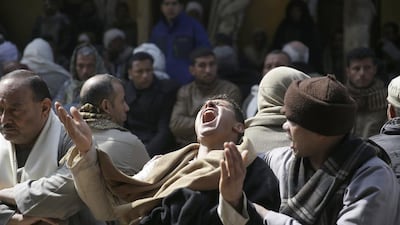CAIRO // Egyptian planes struck ISIL targets in Libya on Monday after the militants beheaded 21 Coptic Christians from Egypt on a beach in Tripoli.
Two waves of airstrikes hit training camps and weapons stores in the eastern city of Derna in what may signal a longer Egyptian military campaign against the extremists.
The UAE expressed its strong backing for Egypt.
The President, Sheikh Khalifa, sent a messages of condolence to president Abdel Fattah El Sisi.
Sheikh Mohammed bin Rashid, Vice President and Ruler of Dubai, and Sheikh Mohammed bin Zayed, Crown Prince of Abu Dhabi and Deputy Supreme Commander of the Armed Forces, also sent messages of support.
Sheikh Abdullah bin Zayed, Minister of Foreign Affairs, said the UAE “supports with all its capabilities Egypt’s efforts in eradicating terrorism and violence directed at its nationals and affirms its complete solidarity”.
The UN Security Council described the beheadings as “heinous and cowardly”. Al Azhar, the seat of Sunni Islamic scholarship, also condemned them.
“Such barbaric action has nothing to do with any religion or human values,” it said.
The video of the beheadings was similar to the ISIL footage of Jordanian pilot Maaz Al Kassasbeh being burned alive.
The hostages were forced to kneel in the sand with a militant behind each one. They were then beheaded one by one, their blood colouring the sand red.
The Egyptian military released a warning in a recording broadcast over images of F-16 fighters taking off at night, and film of the airstrikes. “Vengeance for the blood of Egyptians and retribution against their killers are enforceable,” the military said.
The ministry of foreign affairs said that Egypt expressed its “inherent and unalterable right to legitimate self-defence and to protect its citizens abroad against any threat”.
The Libyan air force said the strikes were coordinated with the Libyan National Army, forces loyal to General Khalifa Haftar.
Its chief, Saqr Al Jaroushi said, that “at least 50” people were killed in airstrikes by Egyptian and Libyan warplanes.
A spokesman for the Libyan Air Force told Egypt’s state-owned flagship newspaper, Al Ahram, that 64 militants were killed in the strikes. Social media accounts in Derna posted photos of civilians that were killed.
Egypt’s defence and foreign ministries were not available for comment.
The 21 men had travelled to Libya for work and were kidnapped in two groups in December and January from the coastal city of Sirte.
Many of them were from the middle Egyptian governorate in Minya, one of the poorest areas of Egypt.
At a mass in the Minya province village of Al Our, from which more than half of the victims killed came, relatives grieved and some demanded vengeance.
“What will be a relief to me is to take a hold of his murderer, tear him apart, eat up his flesh and liver,” said one man, as he wept over the loss of his son Shenouda, 22.
“I want his body back. If they dumped it in the sea, I want it back. If they set fire to it, I want its dust.”
“My son left for Libya 40 days ago after finishing his military service,” said Boshra, a civil servant in his 50s, said of his 22-year-old son Kirollos.
“He went to earn money so he could get married,” he said before breaking down.
About 250,000 Egyptians still work in Libya, according to Capmas, Egypt’s official statistics agency.
In September, a report by the International Organisation for Migration said that two thirds of 2.5 million migrant workers in Libya were Egyptian.
The Egyptian government urged its citizens leave Libya early last month, soon after the kidnappings, citing the deteriorating security situation in the country.
The bombings came as Egypt on Monday became the first foreign buyers of French Rafale fighter jets. France’s defence minister Jean-Yves Le Drian was in Cairo to sign the order for 24 warplanes.
A French presidential aide said that instability in Libyan demonstrated the need to provide Egypt with military equipment.
Olivier Guitta, the managing director of a political risk firm, disagreed.
“Honestly I don’t think the Rafale jet has anything to do with what’s going on in Libya because of the delivery time. Most are going to be delivered in 2016 and 17. They already have about 200 F-16s.”
But Mr Guitta said that Libya was a serious security issue for Egypt.
“Strategically its one of the major countries they’ll have to look at,” he said. “The airstrikes are not going to be a one-time thing. I predict there would be an international level intervention.”
* Additional reporting from agencies
foreign.desk@thenational.ae

